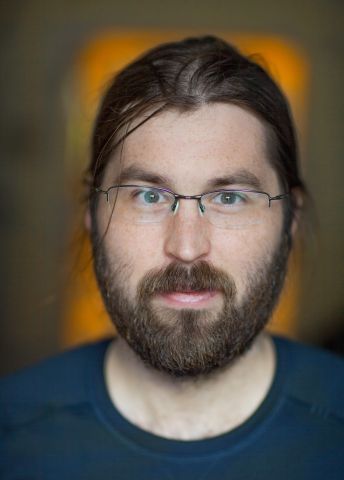
David Seekell
Dr in Environmental Science
Wallenberg Academy Fellow 2015
Institution:
Umeå University
Research field:
Forest lake ecosystems


Wallenberg Academy Fellow 2015
Institution:
Umeå University
Research field:
Forest lake ecosystems
It is only seven degrees Celsius, and a cold wind is blowing as Seekell wades out in Nydalasjön, a lake close to the northern Swedish town of Umeå, to measure the lake water temperature. He is researching into climate change in northern lakes, and is used to taking samples in much worse weather than this.
Back at the Department of Ecology and Environmental Science at Umeå University, he demonstrates a specially-made boat, which was delivered only the day before, and which for the moment rests on the floor in the middle of his office.
The boat is remote controlled and will make sampling easier. Among other things, it can take depth soundings and illuminate the lake bed to make it easier to see the extent of algal growth. The boat is also equipped with sensors that measure how many trees have fallen into the lake, an indicator of habitat quality for fish.
“Much of our sampling is quite straightforward, but it still takes several people to do it. But two will be enough when we use the boat. The boat can also take some kinds of samples without us being there,” Seekell explains.
Environmental researchers and nature conservation agencies are concerned that some forest lake ecosystems are close to collapsing. A warmer climate stimulates growth, and adds to the risk of increasing quantities of decomposed matter entering lakes, streams and rivers. High levels of humus make for browner water.
Bacteria in lakes process organic matter and keep the water clean. But how much can lakes take before the system breaks down?
As a Wallenberg Academy Fellow, Seekell will have both the time and the resources to search for the answer to this question. During the course of the project he will be placing organisms in forest lakes to study how much climate change they can cope with.
To date, only a few experiments of this kind have been performed on whole ecosystems anywhere in the world. The findings may be of use in management of lakes, rivers and streams.
Seekell was not particularly interested in either nature or the environment when he began studying political science in Vermont. An internship at an institution for environmental studies changed all that.
“I just landed in environmental research, and discovered I liked it,” he explains.
Seekell took a bachelor’s degree in natural resources in Vermont, before going on to study for a PhD in Virginia, when his professor moved there.
Five years ago he arrived at Uppsala University on an exchange program under the auspices of the Swedish Research Council. He also visited Umeå University, to which he later returned as a postdoc. For the past couple of years he has been employed there as an assistant senior lecturer.
In 2016 Seekell was awarded the international Science and SciLifeLab Prize for young researchers. Part of the prize was to have work published in Science.
Seekell wrote an essay in which he described the work for his doctoral thesis, which involved studying two lakes in Michigan. The predominant species in one of the lakes was a predatory fish; the other lake contained predominantly small fish. Predatory fish were added to the second lake little by little over a period of four years.
After three years the predatory species reigned supreme in the second lake, although the trend was already clearly evident 18 months before then. Increased availability of the food of the small fish species revealed that it was in decline. There were no other indications at that point.
“This was the first evidence that early warning signals in the ecosystem can be discovered before the change is irreversible,” Seekell says.
He has made his calculations using a mathematical model – one that is often used by economists, but rarely by ecologists. It can identify clear threshold effects, and has been used latterly to predict dramatic changes in such disparate areas as interest rates on home loans, activity on Twitter, and epileptic episodes.
“The project shows how basic ecological research is capable of developing tools that also benefit other areas of society,” Seekell concludes.
David Seekell feels at home in Sweden. All his dealings with the authorities have gone smoothly, and he hopes to continue to be able to focus on research, notwithstanding the arrival of a child in early fall.
“In the States you have to give up everything for the sake of your career. It doesn’t work if two people who live together both have to make sacrifices. Things aren’t quite as stressful in Sweden. You can concentrate on your job, and still have a personal life.”
Seekell also thinks it is much cheaper and simpler to get to places suitable for field work in Sweden than in the U.S. or Canada. For instance, he can walk to Umeå Östra station, and take the train to Abisko, where there is a study site just couple of hundred meters from the train station.
“Wallenberg Academy Fellows has the courage to invest in high-risk projects. I would never have had access to resources like these so early in my career at any U.S. university. Many people talk about supporting young researchers, but few of them put their words into action.”
But experiments involving entire lakes mean recruiting staff with somewhat unusual qualities.
“I need to work with researchers who are independent and good at solving problems. A lot can happen when they fly off in a helicopter to take samples, and have to rough it in the woods for days at a time. The weather can play up, equipment can break down. Most people can acquire scientific skills. But can they mend a broken machine when it’s a two-hour walk out of the forest, when their cellphone isn’t working?”
Text Carin Mannberg-Zackari
Translation Maxwell Arding
Photo Magnus Bergström